Comparative Business Ethics and Social Responsibilites
VerifiedAdded on 2021/06/18
|9
|2338
|92
AI Summary
Contribute Materials
Your contribution can guide someone’s learning journey. Share your
documents today.

Business Ethics 1
COMPARATIVE BUSINESS ETHICS AND SOCIAL RESPONSIBILITIES
by (Name)
The Name of the Class (Course)
Professor (Tutor)
The Name of the School (University)
The City and State where it is located
The Date
COMPARATIVE BUSINESS ETHICS AND SOCIAL RESPONSIBILITIES
by (Name)
The Name of the Class (Course)
Professor (Tutor)
The Name of the School (University)
The City and State where it is located
The Date
Secure Best Marks with AI Grader
Need help grading? Try our AI Grader for instant feedback on your assignments.
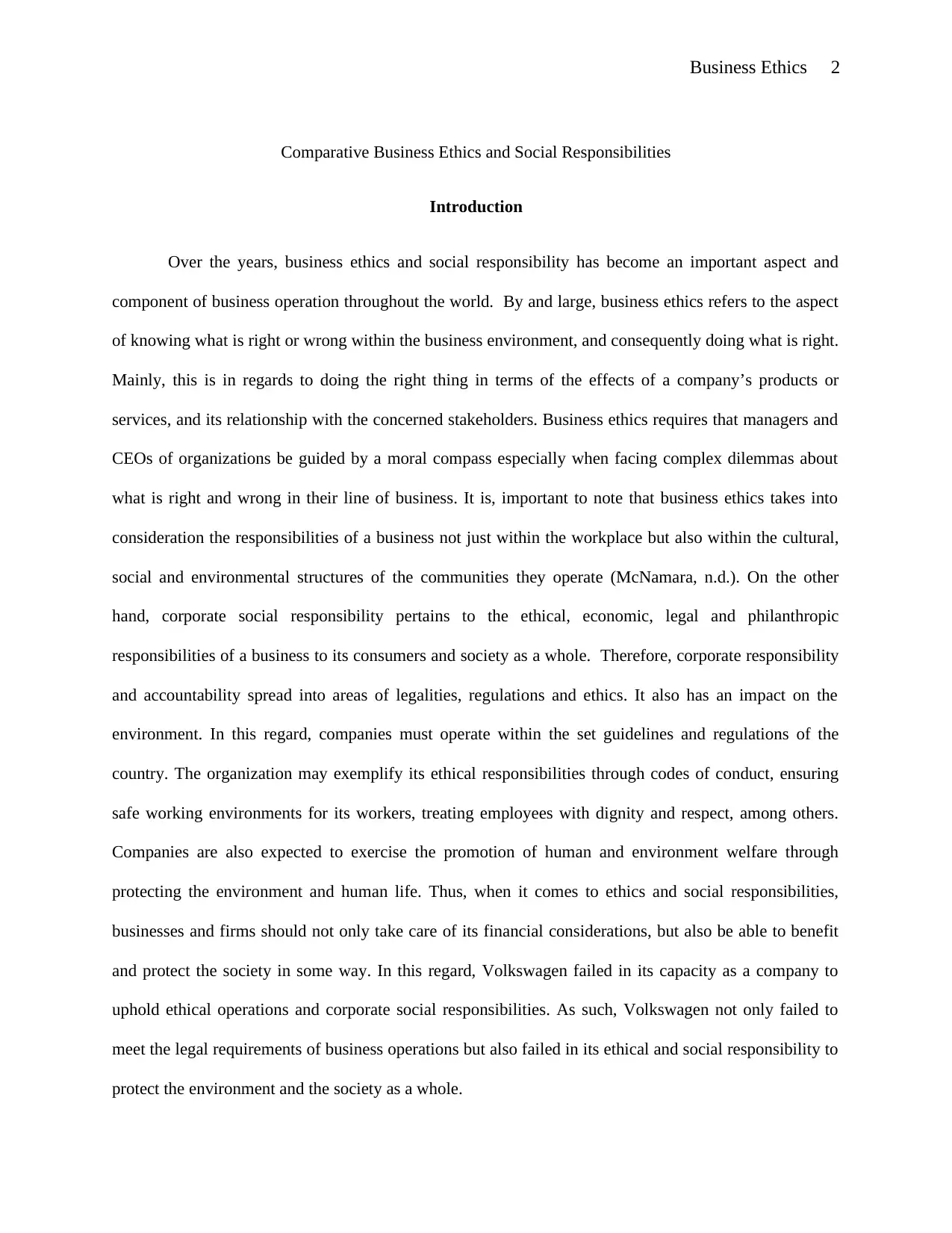
Business Ethics 2
Comparative Business Ethics and Social Responsibilities
Introduction
Over the years, business ethics and social responsibility has become an important aspect and
component of business operation throughout the world. By and large, business ethics refers to the aspect
of knowing what is right or wrong within the business environment, and consequently doing what is right.
Mainly, this is in regards to doing the right thing in terms of the effects of a company’s products or
services, and its relationship with the concerned stakeholders. Business ethics requires that managers and
CEOs of organizations be guided by a moral compass especially when facing complex dilemmas about
what is right and wrong in their line of business. It is, important to note that business ethics takes into
consideration the responsibilities of a business not just within the workplace but also within the cultural,
social and environmental structures of the communities they operate (McNamara, n.d.). On the other
hand, corporate social responsibility pertains to the ethical, economic, legal and philanthropic
responsibilities of a business to its consumers and society as a whole. Therefore, corporate responsibility
and accountability spread into areas of legalities, regulations and ethics. It also has an impact on the
environment. In this regard, companies must operate within the set guidelines and regulations of the
country. The organization may exemplify its ethical responsibilities through codes of conduct, ensuring
safe working environments for its workers, treating employees with dignity and respect, among others.
Companies are also expected to exercise the promotion of human and environment welfare through
protecting the environment and human life. Thus, when it comes to ethics and social responsibilities,
businesses and firms should not only take care of its financial considerations, but also be able to benefit
and protect the society in some way. In this regard, Volkswagen failed in its capacity as a company to
uphold ethical operations and corporate social responsibilities. As such, Volkswagen not only failed to
meet the legal requirements of business operations but also failed in its ethical and social responsibility to
protect the environment and the society as a whole.
Comparative Business Ethics and Social Responsibilities
Introduction
Over the years, business ethics and social responsibility has become an important aspect and
component of business operation throughout the world. By and large, business ethics refers to the aspect
of knowing what is right or wrong within the business environment, and consequently doing what is right.
Mainly, this is in regards to doing the right thing in terms of the effects of a company’s products or
services, and its relationship with the concerned stakeholders. Business ethics requires that managers and
CEOs of organizations be guided by a moral compass especially when facing complex dilemmas about
what is right and wrong in their line of business. It is, important to note that business ethics takes into
consideration the responsibilities of a business not just within the workplace but also within the cultural,
social and environmental structures of the communities they operate (McNamara, n.d.). On the other
hand, corporate social responsibility pertains to the ethical, economic, legal and philanthropic
responsibilities of a business to its consumers and society as a whole. Therefore, corporate responsibility
and accountability spread into areas of legalities, regulations and ethics. It also has an impact on the
environment. In this regard, companies must operate within the set guidelines and regulations of the
country. The organization may exemplify its ethical responsibilities through codes of conduct, ensuring
safe working environments for its workers, treating employees with dignity and respect, among others.
Companies are also expected to exercise the promotion of human and environment welfare through
protecting the environment and human life. Thus, when it comes to ethics and social responsibilities,
businesses and firms should not only take care of its financial considerations, but also be able to benefit
and protect the society in some way. In this regard, Volkswagen failed in its capacity as a company to
uphold ethical operations and corporate social responsibilities. As such, Volkswagen not only failed to
meet the legal requirements of business operations but also failed in its ethical and social responsibility to
protect the environment and the society as a whole.
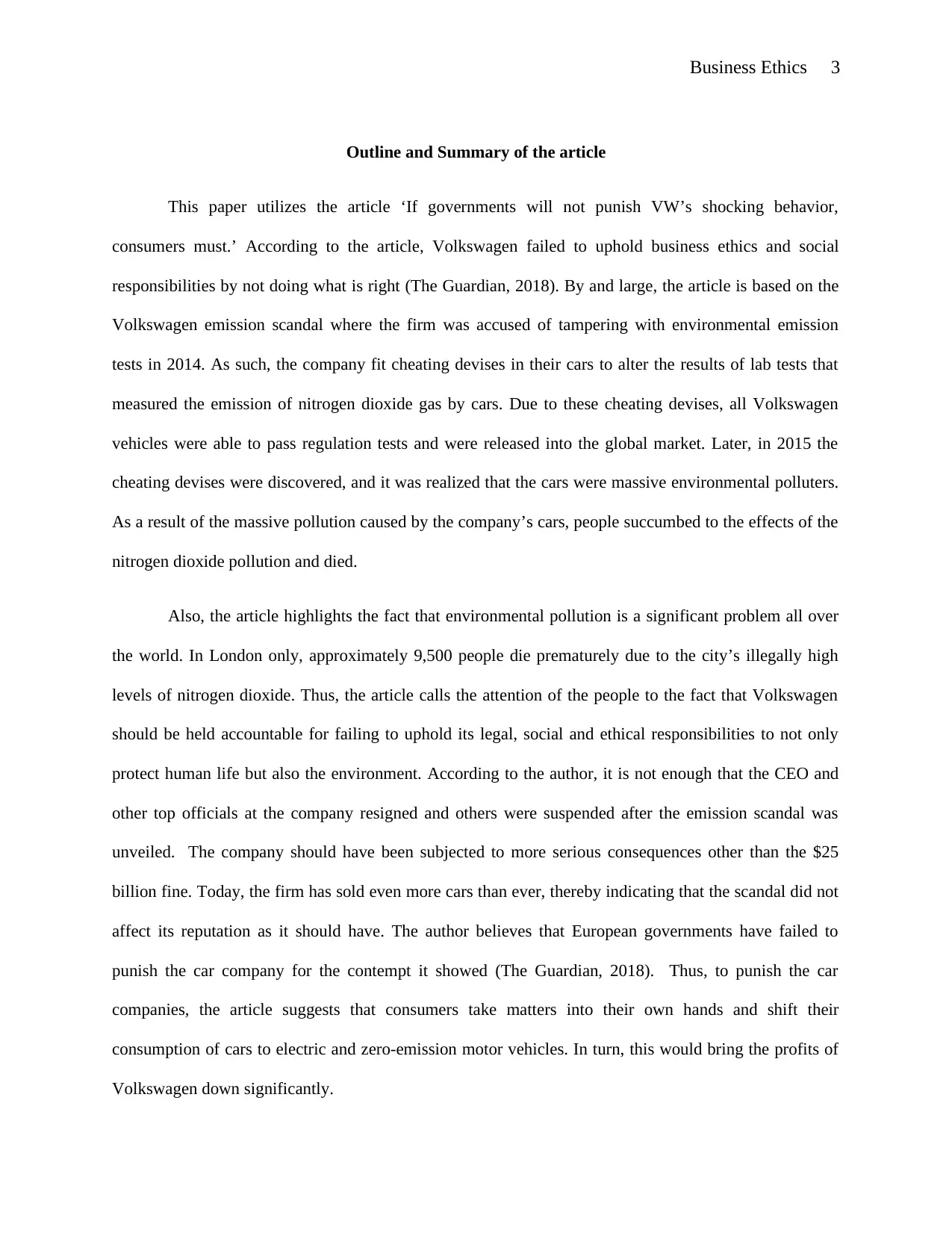
Business Ethics 3
Outline and Summary of the article
This paper utilizes the article ‘If governments will not punish VW’s shocking behavior,
consumers must.’ According to the article, Volkswagen failed to uphold business ethics and social
responsibilities by not doing what is right (The Guardian, 2018). By and large, the article is based on the
Volkswagen emission scandal where the firm was accused of tampering with environmental emission
tests in 2014. As such, the company fit cheating devises in their cars to alter the results of lab tests that
measured the emission of nitrogen dioxide gas by cars. Due to these cheating devises, all Volkswagen
vehicles were able to pass regulation tests and were released into the global market. Later, in 2015 the
cheating devises were discovered, and it was realized that the cars were massive environmental polluters.
As a result of the massive pollution caused by the company’s cars, people succumbed to the effects of the
nitrogen dioxide pollution and died.
Also, the article highlights the fact that environmental pollution is a significant problem all over
the world. In London only, approximately 9,500 people die prematurely due to the city’s illegally high
levels of nitrogen dioxide. Thus, the article calls the attention of the people to the fact that Volkswagen
should be held accountable for failing to uphold its legal, social and ethical responsibilities to not only
protect human life but also the environment. According to the author, it is not enough that the CEO and
other top officials at the company resigned and others were suspended after the emission scandal was
unveiled. The company should have been subjected to more serious consequences other than the $25
billion fine. Today, the firm has sold even more cars than ever, thereby indicating that the scandal did not
affect its reputation as it should have. The author believes that European governments have failed to
punish the car company for the contempt it showed (The Guardian, 2018). Thus, to punish the car
companies, the article suggests that consumers take matters into their own hands and shift their
consumption of cars to electric and zero-emission motor vehicles. In turn, this would bring the profits of
Volkswagen down significantly.
Outline and Summary of the article
This paper utilizes the article ‘If governments will not punish VW’s shocking behavior,
consumers must.’ According to the article, Volkswagen failed to uphold business ethics and social
responsibilities by not doing what is right (The Guardian, 2018). By and large, the article is based on the
Volkswagen emission scandal where the firm was accused of tampering with environmental emission
tests in 2014. As such, the company fit cheating devises in their cars to alter the results of lab tests that
measured the emission of nitrogen dioxide gas by cars. Due to these cheating devises, all Volkswagen
vehicles were able to pass regulation tests and were released into the global market. Later, in 2015 the
cheating devises were discovered, and it was realized that the cars were massive environmental polluters.
As a result of the massive pollution caused by the company’s cars, people succumbed to the effects of the
nitrogen dioxide pollution and died.
Also, the article highlights the fact that environmental pollution is a significant problem all over
the world. In London only, approximately 9,500 people die prematurely due to the city’s illegally high
levels of nitrogen dioxide. Thus, the article calls the attention of the people to the fact that Volkswagen
should be held accountable for failing to uphold its legal, social and ethical responsibilities to not only
protect human life but also the environment. According to the author, it is not enough that the CEO and
other top officials at the company resigned and others were suspended after the emission scandal was
unveiled. The company should have been subjected to more serious consequences other than the $25
billion fine. Today, the firm has sold even more cars than ever, thereby indicating that the scandal did not
affect its reputation as it should have. The author believes that European governments have failed to
punish the car company for the contempt it showed (The Guardian, 2018). Thus, to punish the car
companies, the article suggests that consumers take matters into their own hands and shift their
consumption of cars to electric and zero-emission motor vehicles. In turn, this would bring the profits of
Volkswagen down significantly.

Business Ethics 4
Key Ethical Concerns Raised in the Article
It is imperative to note that the article raises numerous ethical concerns. As such, the dynamics of
the Volkswagen emission scandal are wide and therefore, raise numerous ethical concerns. Some of the
key concerns include leadership integrity and trust, corporate social responsibility, compliance and
governance issues, and corporate governance among others (Oster, 2018).
Corporate Governance
By and large, the Volkswagen emission scandal highlights the ethical concerns of corporate
governance. As such, a corporate agency is usually based on the premise that employees, managers and
directors are agents and, should therefore, act in the best of the shareholders of a business. However, in
some instances, the personal interests of the managers override and overlap those of its shareholders
(Corporate Governance, 2010). Thus, managers may act in a way that hurts the firm and its shareholders.
It is worth noting that the case of Volkswagen is a perfect example highlighting the ethical concerns of
corporate governance. As such, the management of the company made the decision to implant cheating
devices on vehicles with the intention of surpassing regulatory requirements for environmental protection.
This way, the company would penetrate the global market and make numerous sales, thereby improving
profits of the company, and hence the pay of the company’s management. However, they failed to take
into consideration the fact that such a scandal would significantly hurt the shareholders, as the company’s
reputation would be dragged through the mud. Thus, the fraud orchestrated by the management of
Volkswagen highlights the ethical considerations that arise from corporate governance.
In addition, businesses are charged with the responsibility of upholding social welfare by
engaging in fair dealings with all its stakeholders. The stakeholders of a business include suppliers,
customers, employees and the society as a whole (Corporate Governance, n.d.). As a result, the firm is
expected to operate in accordance with the expectations of the society in which they operate by
minimizing their negative externalities such as pollution (Dahl, 2011). It is worth noting that corporations
Key Ethical Concerns Raised in the Article
It is imperative to note that the article raises numerous ethical concerns. As such, the dynamics of
the Volkswagen emission scandal are wide and therefore, raise numerous ethical concerns. Some of the
key concerns include leadership integrity and trust, corporate social responsibility, compliance and
governance issues, and corporate governance among others (Oster, 2018).
Corporate Governance
By and large, the Volkswagen emission scandal highlights the ethical concerns of corporate
governance. As such, a corporate agency is usually based on the premise that employees, managers and
directors are agents and, should therefore, act in the best of the shareholders of a business. However, in
some instances, the personal interests of the managers override and overlap those of its shareholders
(Corporate Governance, 2010). Thus, managers may act in a way that hurts the firm and its shareholders.
It is worth noting that the case of Volkswagen is a perfect example highlighting the ethical concerns of
corporate governance. As such, the management of the company made the decision to implant cheating
devices on vehicles with the intention of surpassing regulatory requirements for environmental protection.
This way, the company would penetrate the global market and make numerous sales, thereby improving
profits of the company, and hence the pay of the company’s management. However, they failed to take
into consideration the fact that such a scandal would significantly hurt the shareholders, as the company’s
reputation would be dragged through the mud. Thus, the fraud orchestrated by the management of
Volkswagen highlights the ethical considerations that arise from corporate governance.
In addition, businesses are charged with the responsibility of upholding social welfare by
engaging in fair dealings with all its stakeholders. The stakeholders of a business include suppliers,
customers, employees and the society as a whole (Corporate Governance, n.d.). As a result, the firm is
expected to operate in accordance with the expectations of the society in which they operate by
minimizing their negative externalities such as pollution (Dahl, 2011). It is worth noting that corporations
Secure Best Marks with AI Grader
Need help grading? Try our AI Grader for instant feedback on your assignments.
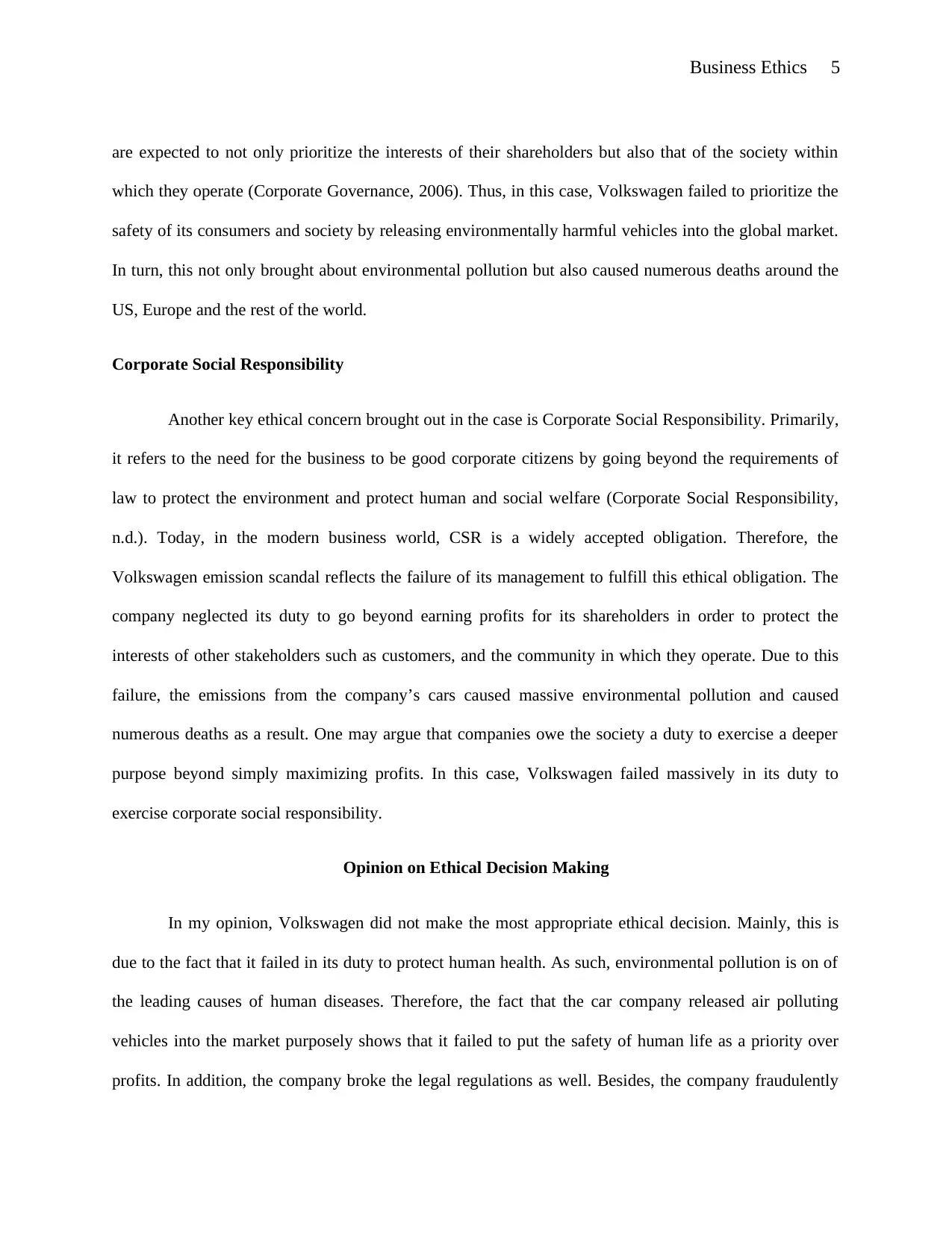
Business Ethics 5
are expected to not only prioritize the interests of their shareholders but also that of the society within
which they operate (Corporate Governance, 2006). Thus, in this case, Volkswagen failed to prioritize the
safety of its consumers and society by releasing environmentally harmful vehicles into the global market.
In turn, this not only brought about environmental pollution but also caused numerous deaths around the
US, Europe and the rest of the world.
Corporate Social Responsibility
Another key ethical concern brought out in the case is Corporate Social Responsibility. Primarily,
it refers to the need for the business to be good corporate citizens by going beyond the requirements of
law to protect the environment and protect human and social welfare (Corporate Social Responsibility,
n.d.). Today, in the modern business world, CSR is a widely accepted obligation. Therefore, the
Volkswagen emission scandal reflects the failure of its management to fulfill this ethical obligation. The
company neglected its duty to go beyond earning profits for its shareholders in order to protect the
interests of other stakeholders such as customers, and the community in which they operate. Due to this
failure, the emissions from the company’s cars caused massive environmental pollution and caused
numerous deaths as a result. One may argue that companies owe the society a duty to exercise a deeper
purpose beyond simply maximizing profits. In this case, Volkswagen failed massively in its duty to
exercise corporate social responsibility.
Opinion on Ethical Decision Making
In my opinion, Volkswagen did not make the most appropriate ethical decision. Mainly, this is
due to the fact that it failed in its duty to protect human health. As such, environmental pollution is on of
the leading causes of human diseases. Therefore, the fact that the car company released air polluting
vehicles into the market purposely shows that it failed to put the safety of human life as a priority over
profits. In addition, the company broke the legal regulations as well. Besides, the company fraudulently
are expected to not only prioritize the interests of their shareholders but also that of the society within
which they operate (Corporate Governance, 2006). Thus, in this case, Volkswagen failed to prioritize the
safety of its consumers and society by releasing environmentally harmful vehicles into the global market.
In turn, this not only brought about environmental pollution but also caused numerous deaths around the
US, Europe and the rest of the world.
Corporate Social Responsibility
Another key ethical concern brought out in the case is Corporate Social Responsibility. Primarily,
it refers to the need for the business to be good corporate citizens by going beyond the requirements of
law to protect the environment and protect human and social welfare (Corporate Social Responsibility,
n.d.). Today, in the modern business world, CSR is a widely accepted obligation. Therefore, the
Volkswagen emission scandal reflects the failure of its management to fulfill this ethical obligation. The
company neglected its duty to go beyond earning profits for its shareholders in order to protect the
interests of other stakeholders such as customers, and the community in which they operate. Due to this
failure, the emissions from the company’s cars caused massive environmental pollution and caused
numerous deaths as a result. One may argue that companies owe the society a duty to exercise a deeper
purpose beyond simply maximizing profits. In this case, Volkswagen failed massively in its duty to
exercise corporate social responsibility.
Opinion on Ethical Decision Making
In my opinion, Volkswagen did not make the most appropriate ethical decision. Mainly, this is
due to the fact that it failed in its duty to protect human health. As such, environmental pollution is on of
the leading causes of human diseases. Therefore, the fact that the car company released air polluting
vehicles into the market purposely shows that it failed to put the safety of human life as a priority over
profits. In addition, the company broke the legal regulations as well. Besides, the company fraudulently
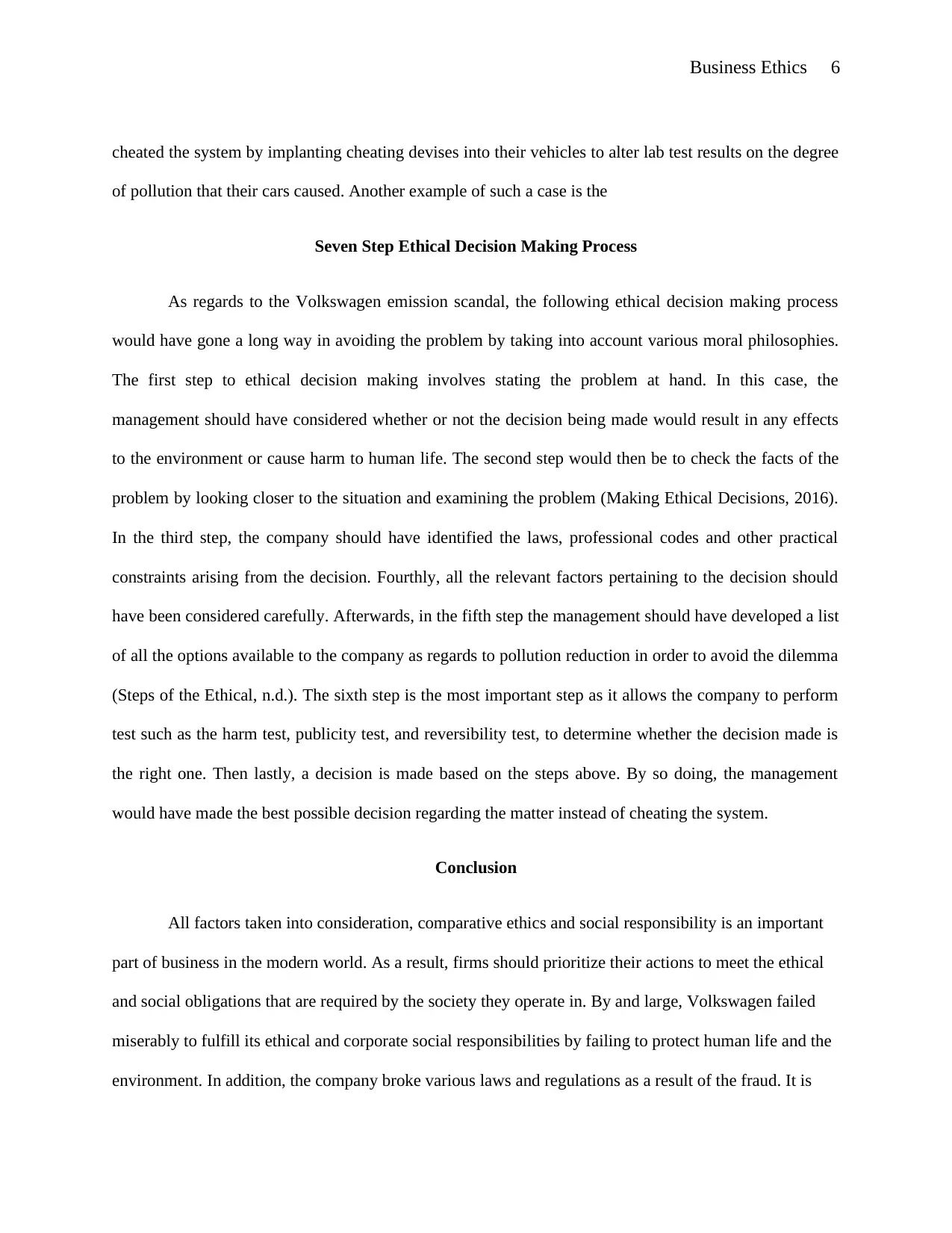
Business Ethics 6
cheated the system by implanting cheating devises into their vehicles to alter lab test results on the degree
of pollution that their cars caused. Another example of such a case is the
Seven Step Ethical Decision Making Process
As regards to the Volkswagen emission scandal, the following ethical decision making process
would have gone a long way in avoiding the problem by taking into account various moral philosophies.
The first step to ethical decision making involves stating the problem at hand. In this case, the
management should have considered whether or not the decision being made would result in any effects
to the environment or cause harm to human life. The second step would then be to check the facts of the
problem by looking closer to the situation and examining the problem (Making Ethical Decisions, 2016).
In the third step, the company should have identified the laws, professional codes and other practical
constraints arising from the decision. Fourthly, all the relevant factors pertaining to the decision should
have been considered carefully. Afterwards, in the fifth step the management should have developed a list
of all the options available to the company as regards to pollution reduction in order to avoid the dilemma
(Steps of the Ethical, n.d.). The sixth step is the most important step as it allows the company to perform
test such as the harm test, publicity test, and reversibility test, to determine whether the decision made is
the right one. Then lastly, a decision is made based on the steps above. By so doing, the management
would have made the best possible decision regarding the matter instead of cheating the system.
Conclusion
All factors taken into consideration, comparative ethics and social responsibility is an important
part of business in the modern world. As a result, firms should prioritize their actions to meet the ethical
and social obligations that are required by the society they operate in. By and large, Volkswagen failed
miserably to fulfill its ethical and corporate social responsibilities by failing to protect human life and the
environment. In addition, the company broke various laws and regulations as a result of the fraud. It is
cheated the system by implanting cheating devises into their vehicles to alter lab test results on the degree
of pollution that their cars caused. Another example of such a case is the
Seven Step Ethical Decision Making Process
As regards to the Volkswagen emission scandal, the following ethical decision making process
would have gone a long way in avoiding the problem by taking into account various moral philosophies.
The first step to ethical decision making involves stating the problem at hand. In this case, the
management should have considered whether or not the decision being made would result in any effects
to the environment or cause harm to human life. The second step would then be to check the facts of the
problem by looking closer to the situation and examining the problem (Making Ethical Decisions, 2016).
In the third step, the company should have identified the laws, professional codes and other practical
constraints arising from the decision. Fourthly, all the relevant factors pertaining to the decision should
have been considered carefully. Afterwards, in the fifth step the management should have developed a list
of all the options available to the company as regards to pollution reduction in order to avoid the dilemma
(Steps of the Ethical, n.d.). The sixth step is the most important step as it allows the company to perform
test such as the harm test, publicity test, and reversibility test, to determine whether the decision made is
the right one. Then lastly, a decision is made based on the steps above. By so doing, the management
would have made the best possible decision regarding the matter instead of cheating the system.
Conclusion
All factors taken into consideration, comparative ethics and social responsibility is an important
part of business in the modern world. As a result, firms should prioritize their actions to meet the ethical
and social obligations that are required by the society they operate in. By and large, Volkswagen failed
miserably to fulfill its ethical and corporate social responsibilities by failing to protect human life and the
environment. In addition, the company broke various laws and regulations as a result of the fraud. It is

Business Ethics 7
however important for all organizations to take keen interest in fulfilling their ethical and social
responsibilities to the society in which they operate in.
however important for all organizations to take keen interest in fulfilling their ethical and social
responsibilities to the society in which they operate in.
Paraphrase This Document
Need a fresh take? Get an instant paraphrase of this document with our AI Paraphraser
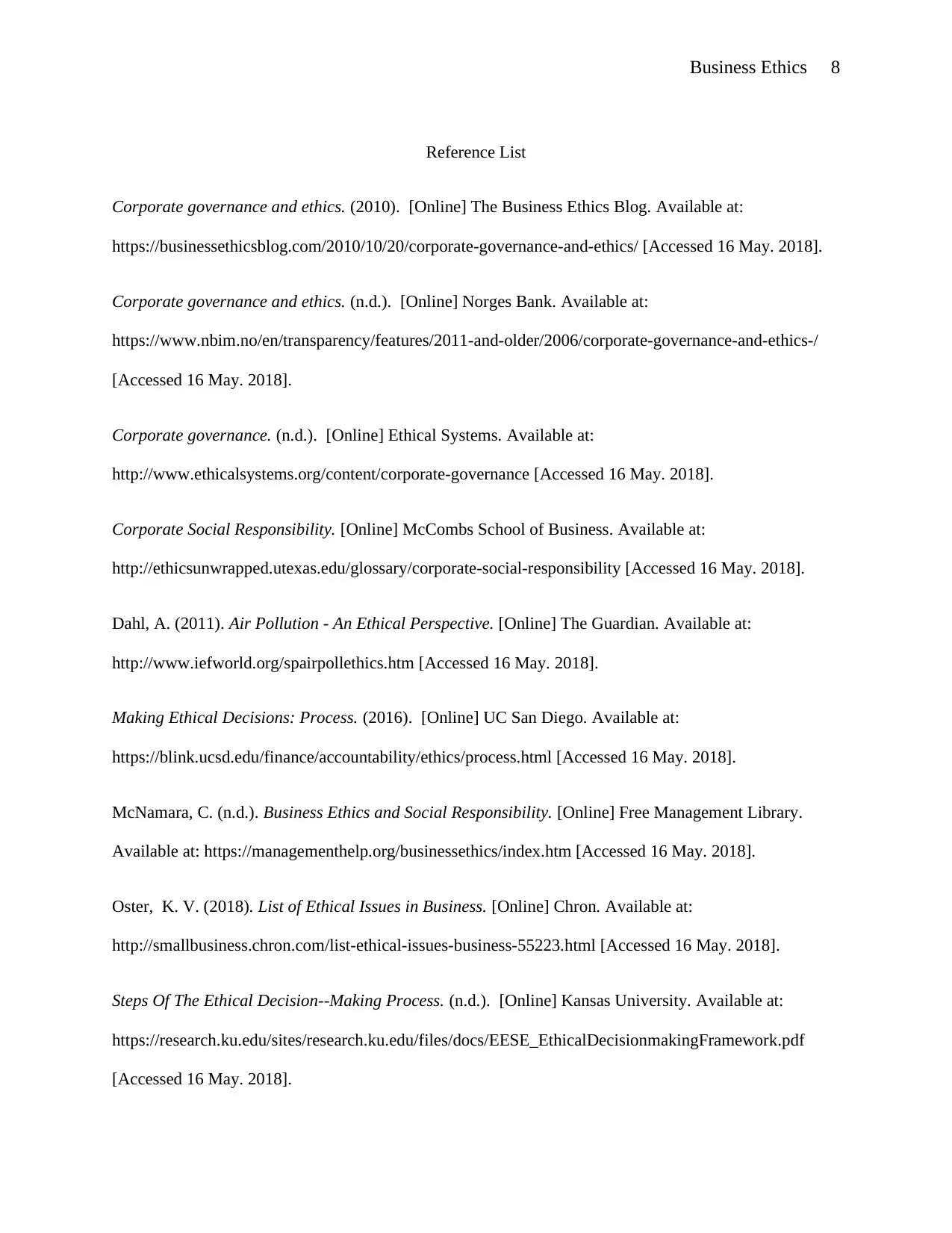
Business Ethics 8
Reference List
Corporate governance and ethics. (2010). [Online] The Business Ethics Blog. Available at:
https://businessethicsblog.com/2010/10/20/corporate-governance-and-ethics/ [Accessed 16 May. 2018].
Corporate governance and ethics. (n.d.). [Online] Norges Bank. Available at:
https://www.nbim.no/en/transparency/features/2011-and-older/2006/corporate-governance-and-ethics-/
[Accessed 16 May. 2018].
Corporate governance. (n.d.). [Online] Ethical Systems. Available at:
http://www.ethicalsystems.org/content/corporate-governance [Accessed 16 May. 2018].
Corporate Social Responsibility. [Online] McCombs School of Business. Available at:
http://ethicsunwrapped.utexas.edu/glossary/corporate-social-responsibility [Accessed 16 May. 2018].
Dahl, A. (2011). Air Pollution - An Ethical Perspective. [Online] The Guardian. Available at:
http://www.iefworld.org/spairpollethics.htm [Accessed 16 May. 2018].
Making Ethical Decisions: Process. (2016). [Online] UC San Diego. Available at:
https://blink.ucsd.edu/finance/accountability/ethics/process.html [Accessed 16 May. 2018].
McNamara, C. (n.d.). Business Ethics and Social Responsibility. [Online] Free Management Library.
Available at: https://managementhelp.org/businessethics/index.htm [Accessed 16 May. 2018].
Oster, K. V. (2018). List of Ethical Issues in Business. [Online] Chron. Available at:
http://smallbusiness.chron.com/list-ethical-issues-business-55223.html [Accessed 16 May. 2018].
Steps Of The Ethical Decision--Making Process. (n.d.). [Online] Kansas University. Available at:
https://research.ku.edu/sites/research.ku.edu/files/docs/EESE_EthicalDecisionmakingFramework.pdf
[Accessed 16 May. 2018].
Reference List
Corporate governance and ethics. (2010). [Online] The Business Ethics Blog. Available at:
https://businessethicsblog.com/2010/10/20/corporate-governance-and-ethics/ [Accessed 16 May. 2018].
Corporate governance and ethics. (n.d.). [Online] Norges Bank. Available at:
https://www.nbim.no/en/transparency/features/2011-and-older/2006/corporate-governance-and-ethics-/
[Accessed 16 May. 2018].
Corporate governance. (n.d.). [Online] Ethical Systems. Available at:
http://www.ethicalsystems.org/content/corporate-governance [Accessed 16 May. 2018].
Corporate Social Responsibility. [Online] McCombs School of Business. Available at:
http://ethicsunwrapped.utexas.edu/glossary/corporate-social-responsibility [Accessed 16 May. 2018].
Dahl, A. (2011). Air Pollution - An Ethical Perspective. [Online] The Guardian. Available at:
http://www.iefworld.org/spairpollethics.htm [Accessed 16 May. 2018].
Making Ethical Decisions: Process. (2016). [Online] UC San Diego. Available at:
https://blink.ucsd.edu/finance/accountability/ethics/process.html [Accessed 16 May. 2018].
McNamara, C. (n.d.). Business Ethics and Social Responsibility. [Online] Free Management Library.
Available at: https://managementhelp.org/businessethics/index.htm [Accessed 16 May. 2018].
Oster, K. V. (2018). List of Ethical Issues in Business. [Online] Chron. Available at:
http://smallbusiness.chron.com/list-ethical-issues-business-55223.html [Accessed 16 May. 2018].
Steps Of The Ethical Decision--Making Process. (n.d.). [Online] Kansas University. Available at:
https://research.ku.edu/sites/research.ku.edu/files/docs/EESE_EthicalDecisionmakingFramework.pdf
[Accessed 16 May. 2018].

Business Ethics 9
The Guardian (2018). If governments will not punish VW’s shocking behaviour, consumers must. [Online]
Available at https://www.theguardian.com/business/2018/feb/04/volkswagen-shocking-behaviour-punish-
consumers-must-punish-it [Accessed 16 May. 2018].
The Guardian (2018). If governments will not punish VW’s shocking behaviour, consumers must. [Online]
Available at https://www.theguardian.com/business/2018/feb/04/volkswagen-shocking-behaviour-punish-
consumers-must-punish-it [Accessed 16 May. 2018].
1 out of 9
Related Documents
Your All-in-One AI-Powered Toolkit for Academic Success.
+13062052269
info@desklib.com
Available 24*7 on WhatsApp / Email
![[object Object]](/_next/static/media/star-bottom.7253800d.svg)
Unlock your academic potential
© 2024 | Zucol Services PVT LTD | All rights reserved.





